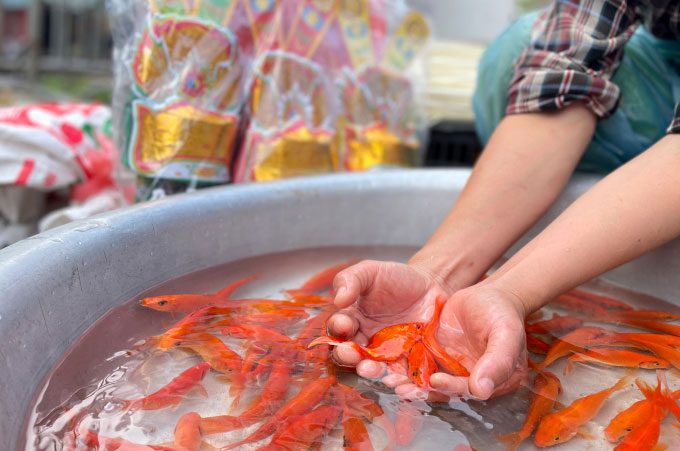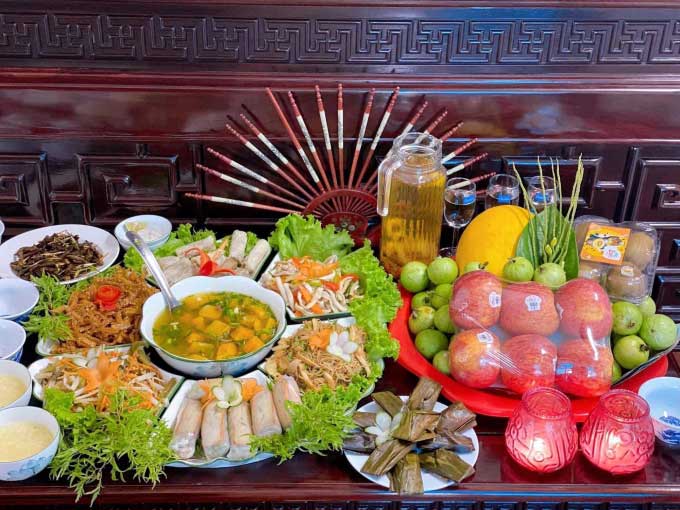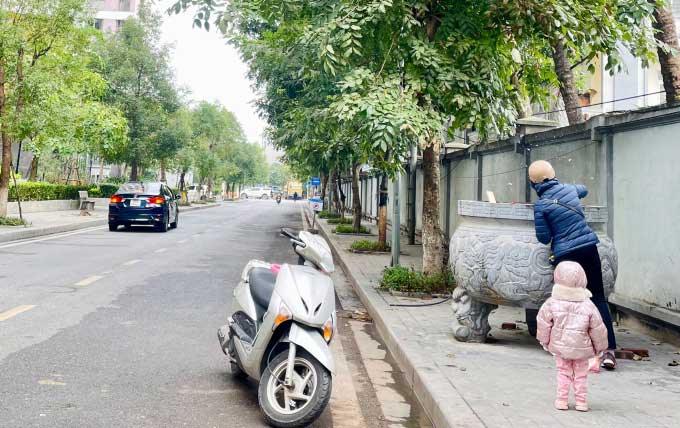The practice of burning paper offerings can lead to environmental pollution, and releasing fish improperly can cause them to die, which is akin to killing living beings. As a result, many families have abandoned this tradition during the worship of the Kitchen Gods (Ông Công, Ông Táo).
Ms. Anh Tuyet, 32, a university lecturer in Hoang Mai District, Hanoi, shared that many years ago, her family also held the ritual for the Kitchen Gods like everyone else. During such occasions, the neighborhood was filled with the strong smell of smoke and dust from burning offerings, which was uncomfortable for everyone.
Three years ago, during a Dharma talk at a temple, Tuyet realized that burning paper offerings only adds to environmental pollution, and releasing fish that cannot survive is also harmful. She explored new cultural lifestyles from those around her and through media, identifying what was good traditions from the past to preserve and what was no longer suitable to change. “Since then, my family has switched to vegetarian offerings and stopped the practice of burning paper and releasing fish,” Tuyet stated.
In the first year of this change, she felt “a bit unaccustomed” and was still worried. However, the following year, all family members were safe and sound, even doing better in every aspect. “Initially, both sides of the family expressed their opinions about this. After I explained, both the paternal and maternal sides also abandoned the habit of burning paper,” she added.
Now, all members of her family are aware of the severe environmental pollution, and they understand that burning paper offerings exacerbates this situation. Her family collectively decided to allocate their annual budget for paper offerings, around 5 million VND, to contribute to a charity fund to help orphaned children.

Vendors selling carp and paper offerings for the Kitchen Gods celebration at Co Nhue Market, Bac Tu Liem, Hanoi, on December 21. (Photo: Phan Duong).
Living in an apartment in Ha Dong District, Hanoi, Mr. Thanh Tung, 40, expressed his concern about the scene of people eagerly buying paper offerings to burn during this occasion.
“I also know some local residents who catch snails, use electric shocks to catch fish, and hunt birds… to sell for people to release. Nature will eventually return to nature, but in the process, it disrupts the ecosystem and kills many living beings,” he said. One year, he even witnessed someone burning paper offerings near a car park.
“From burning paper offerings very little, for the past two years, I have also stopped burning them. Some people call me eccentric, and there are whispers that I am an atheist, but I don’t care,” Tung remarked.

A vegetarian meal offered to the Kitchen Gods by Ms. Anh Tuyet’s family in Hoang Mai District. (Photo: Provided by the subject).
Like Mr. Tung, when sharing her story about not burning paper offerings or releasing carp on the Kitchen Gods day on social media, Ms. Cao Thanh Thuy, 30, a businesswoman in Hanoi, received mixed opinions. Nevertheless, this is her fourth year doing so. “I think burning paper offerings is no different from burning money; it’s both wasteful and polluting,” Thuy shared.
Influenced by her father, who built a house without consulting auspicious dates or had weddings without considering the days, Thuy has also simplified the rituals since she got married three years ago. On the Kitchen Gods holiday, she prepares an attractive meal to offer to her ancestors. The offering is suitable for her young family’s needs, minimizing waste.
“When I do this, I feel joyful, my family is at peace, and the kitchen is warm all year round with a wife cooking and a husband bustling around picking vegetables. After all, isn’t that the ultimate goal that everyone desires?”, Thuy said.
Commenting on the actions of these families, cultural and historical researcher Tran Dinh Son stated that since ancient times, people have worshiped natural phenomena like earth, water, and the sun to pray for peace. Gradually, this worship evolved into folk beliefs honoring deities such as the Kitchen Gods and the God of Wealth. Among them, the Kitchen God, associated with the land, is the most familiar deity protecting the family, while the other Kitchen God oversees cooking and food.
The Kitchen Gods festival has a history of thousands of years, with a profound purpose of reminding people to live according to moral principles. However, today’s modern life often favors form over substance, diminishing traditional values. Each year during this time, there is an uproar about the rampant burning of paper offerings and reckless releasing of living beings.
According to Mr. Son, burning paper offerings and releasing fish are two long-standing folk practices. People are allowed to burn paper offerings as per state regulations. However, it should not be done excessively, causing environmental pollution. In Buddhism, it is advised that followers should not burn paper offerings.
The folk belief is that releasing carp provides a means for the Kitchen Gods to ascend to heaven. Releasing fish in temples is considered a form of liberation. This act is not harmful when it involves saving precious animals or those about to be slaughtered and returning them to nature. However, releasing species that harm the environment or indiscriminately releasing fish and littering is contrary to folk beliefs and Buddhist teachings.

A resident burning paper offerings during the Kitchen Gods festival in an urban area in Bac Tu Liem District. (Photo: Phan Duong)
Associate Professor Bui Hoai Son from the National Assembly’s Culture and Education Committee believes that preserving tradition is essential. “The act of releasing carp and worshiping the Kitchen Gods is not merely about releasing a fish or burning paper offerings. It holds significant meaning in the development of character and morality among Vietnamese people,” he remarked.
As a cultural researcher, Mr. Son hopes that people will practice traditional rituals. “However, we need to understand that what we should preserve is the spirit, not the form. Burning paper offerings is merely symbolic; it is our way of connecting with deities, a belief in luck, or other values. It does not mean that burning more paper offerings or releasing larger carp will bring more luck than burning less or releasing smaller carp,” Mr. Son explained.
Therefore, people should practice civilized rituals, keeping the area clean while burning paper offerings to avoid fire hazards. When releasing fish, it should be done in a way that ensures the fish survive, without using plastic bags or littering that affects the environment.
According to Mr. Son, through these practices, we also educate people about moral values and national culture, thereby continuing cultural transmission and fostering the confidence and resilience of the Vietnamese people for better integration.
“The cultural values of the nation are hidden behind customs and practices,” affirmed Associate Professor Bui Hoai Son.




















































